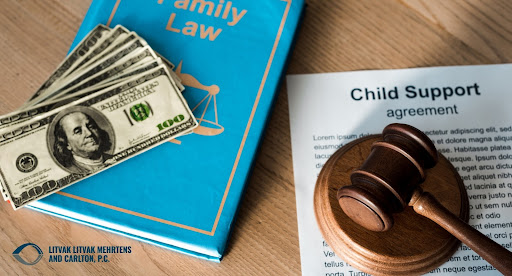As Colorado’s most respected family law firm, attorneys at Litvak Litvak Mehrtens and Carlton strive to make stressful life events like divorce, alimony payments, child custody, and child support as easy as possible for our clients. One thing that can really complicate all of those life events is annual taxes. In fact, this is one of the most common questions we receive from our divorced clients with children: is child support tax deductible?
At Litvak Litvak Mehrtens and Carlton, we prioritize ever attorney client relationship while fighting for our clients to receive the best possible outcomes regarding their family matters. For more information, or to speak to a Denver family lawyer on how we can help you, call 303-951-4506 today.
Colorado Child Support Basics
Child support is basically monthly payments made by the noncustodial parent to the custodial parent. It’s financially stressful to raise a child with everything they need and want, and it’s even harder to do this when parents divorce. So paying child support can cover expenses like:
- All of the child’s medical and dental expenses
- School supplies
- Physical therapy, if necessary
- School or sports uniforms
- Music lessons and other hobbies
- Weekly groceries
- Field trip expenses
- Daycare or babysitting costs
- School lunches
The ultimate goal of child support payments is to give the child the best quality of life possible following a divorce. Colorado is different than many other states in its views of child support. Most states recognize that every custodial parent and noncustodial parent has the right to provide financial support for their children. However, Colorado mandates child support as the child’s human right following divorce.
Calculating Child Support Payments
There is no set monetary amount for child support payments. Courts will consider a variety of factors, including:
- The Child’s Needs. Possibly the most important factor when it comes to calculating child support is first looking at what the child needs. Do they suffer from a chronic illness that requires frequent doctor’s appointments and expensive medical equipment? Does the child have a learning or neurological disability that requires special schooling and therapy? Does the child have to follow a specific, expensive diet for the sake of their health? Colorado courts will consider all of this and more.
- Parent’s Total Income. Courts will also consider the gross income of both parents, but especially the income of the parent who has primary custody of the child. If the custodial parent doesn’t make enough money to completely cover the child’s medical, food, therapy, and school expenses, the non custodial parent may have to pay a large chunk of child support monthly to help out. Courts will require both parents to provide their earnings history and financial statements.
- The Age of the Child. Most U.S. states require a non custodial parent to pay child support until the child turns 18 years old. However, Colorado mandates that noncustodial parents provide child support payments until the child reaches 19 years of age.
- Amount of Children. If there’s more than one child, the custodial parent will naturally need more more money to provide for all of the children’s basic needs.
- The Child’s Quality of Life Prior to Divorce. The ultimate priority of Colorado courts is to keep the child’s best interests in mind and provide the child with the best quality of life. So the child support payments received are supposed to go towards creating the child’s quality of life prior to the divorce for the sake of an easy transition for them.
Average Amounts of Child Support Paid Annually in the U.S.

Did you know that many custodial parents don’t receive the amount of child support they’re promised? According to U.S. Census data from 2015, noncustodial parents paid an average of $5,760 annually for child support. That number boils down to about $500 monthly. But custodial parents only received an average of $3,447 annually, which boils down to about $287 monthly.
Child Support Tax Rules
Possibly the most confusing part about child support is taxes. How does it work? Who gets to claim the child on federal tax returns each calendar year? And is child support considered income? We’ll answer it all for you.
Is Child Support Tax Deductible?
Firstly, is child support tax deductible? According to the Internal Revenue Service (IRS), Child support payments are neither deductible by the non custodial parent nor taxable to the custodial parent. However, the opposite is true alimony payments. The IRS states that if your divorce happened before December 31, 2018, then both ex-spouses can deduct alimony payments.
Is Child Support Considered Taxable Income?
No, child support is not taxable income. The Internal Revenue Service (IRS) states that when it’s time to file an income tax return, you need to provide your annual gross income without the extra income you receive from child support payments.
Who Claims the Child on Taxes With 50/50 Custody?
Sometimes your court order will already specify which parent should claim the child on their taxes. If not, you need to follow IRS rules. Basically, the IRS dictates that the parent who makes the most money annually gets to claim the child as a dependent on their tax return, even if that parent spends absolutely zero time with them. If the parents make similar amount of money, annually, then they must alternate years in claiming the child as a dependent. This issue can get confusing especially if there are multiple children in the picture, so make sure to work out the complete details about who gets to claim the child in your custody order.
See Also: Who Claims the Child on Taxes With 50/50 Custody?
What is Child Tax Credit?
A child tax credit (CTC) is one of the tax benefits available to parents with a qualifying child or children. CTC first became available in 1997 through the Taxpayer Relief Act which was designed to financially support Americans with children.
Until the COVID-19 pandemic came into the picture, most taxpayers received up to $2,000 for every dependent child. But in 2021, the max CTC went up to $3,600 as part of President Biden’s American Rescue Plan in response to financial stress caused by COVID-19. On top of that, American taxpayers received half of CTC as monthly payments between July and December of 2021.
What is a Dependent Exemption?
A dependent exemption is basically the taxable income that you’re allowed to leave out on your tax return for each of your dependents. In this situation, a child can qualify as a dependent if they’re under the age of 19 or if they’re under the age of 24 and they’re a full-time student. A relative can also qualify as a dependent if they earn less than $4,300 annually.
What is Earned Income Tax Credit?
Parents can claim several tax benefits through earned income credit (EITC).
What is a Qualifying Child?
A qualifying child may allow parents to receive earned income tax credit. In order to be a qualifying child though, children must:
- Have a social security number
- Not be claimed by someone else as a qualifying child
- Any age as long as they’re completely disabled
- Under the age of 19 by the end of the tax year and younger than their parents
- Under the age of 24 by the end of the tax year, a full-time student for at least 5 months, and younger than their parents
- Be your daughter, son, step child, foster child, or adopted child
- Live in the same U.S. home with you for more than half of the year
- Not have filed a joint return with someone else
How Missed Child Support Payments Can Affect Taxes

Missing child support payments is a big deal. A former spouse who consistently misses payments will be in contempt of court. Additionally, the former spouse who fails to make payments will face arrears, which is basically just an accumulation of debt. As punishment for not paying child support, the parent could face punishments such as court hearings, wage garnishment, suspended licenses and passports, and even a short prison sentence. The court also has the authority to seize your state and federal tax refunds in order to cover late or unpaid child support payments.
Call Colorado’s Most Respected Family Attorneys Today
At Litvak Litvak Mehrtens and Carlton, we know exactly how complicated divorce, child custody, child support can be. We also know much these major life events can affect your annual tax return. Colorado divorce attorneys want to walk with you through major life events like divorce and child custody disputes. For more information on how we can help you, call 303-951-4506 today.





